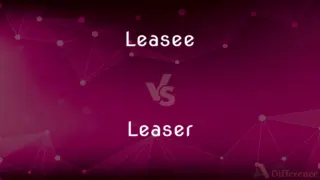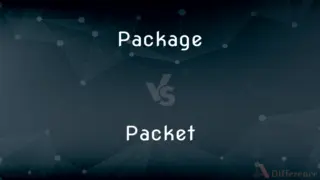Conjecture vs. Inference — What's the Difference?
By Maham Liaqat & Urooj Arif — Updated on April 16, 2024
Conjectures are assumptions made without complete evidence, often used in math and logic, while inferences are conclusions drawn from evidence and reasoning in various disciplines.

Difference Between Conjecture and Inference
Table of Contents
ADVERTISEMENT
Key Differences
A conjecture is a preliminary assumption or hypothesis proposed in the absence of complete information, typically used in mathematics to suggest a potential truth awaiting proof. In contrast, an inference involves deriving a conclusion based on evidence and established reasoning, prevalent across various fields such as science and philosophy.
Conjectures are often used in mathematical proofs where they serve as the starting point for formal verification, while inferences are critical in empirical research where conclusions must be drawn from experimental data.
While conjectures require creativity and intuition to formulate, as they often precede detailed analysis or experimental proof, inferences depend on logical progression and previously established facts to ensure validity and accuracy.
The development of a conjecture often invites further exploration and testing, aiming to either prove or disprove the proposed hypothesis, whereas an inference builds upon existing knowledge to enhance understanding or establish new facts.
Conjectures can remain unverified for years, existing as possible truths within the theoretical realms of subjects like mathematics, whereas inferences typically lead to immediate applications or conclusions in their respective fields, impacting theories and practices more directly.
ADVERTISEMENT
Comparison Chart
Definition
An assumption made without full evidence
A conclusion derived from evidence
Usage in Disciplines
Primarily in mathematics and theoretical sciences
Across all scientific disciplines and logic
Basis
Intuition, hypothesis
Evidence, reasoning
Outcome
Remains theoretical until proven
Generally accepted as factual or true
Purpose
To propose new ideas for testing
To draw conclusions from existing data
Compare with Definitions
Conjecture
A proposition that is unproven but appears correct.
Riemann's conjecture has spurred numerous studies in number theory.
Inference
A conclusion reached on the basis of evidence and reasoning.
From the footprints, she made an inference about the animal's size.
Conjecture
A guess based on incomplete information.
Her conjecture was that the market would crash, which it did months later.
Inference
The reasoning involved in drawing a conclusion or making a logical judgment.
The jury's inference was critical to the verdict.
Conjecture
A theoretical proposition in the absence of complete data.
His conjecture on the pattern of prime numbers remains unverified.
Inference
The act of deriving logical conclusions from premises known or assumed to be true.
His inference was based on the experiment’s quantitative data.
Conjecture
A statement used to initiate further investigation.
The scientist's conjecture led to a major breakthrough in quantum mechanics.
Inference
The process of inferring things based on what is already known.
Through careful inference, they predicted the storm's path.
Conjecture
A speculative hypothesis or assumption.
The Goldbach conjecture posits that every even number greater than two is the sum of two primes.
Inference
A deduction or conclusion that follows logically from the facts.
The inference drawn from the archaeological findings changed historical perspectives.
Conjecture
In mathematics, a conjecture is a conclusion or a proposition which is suspected to be true due to preliminary supporting evidence, but for which no proof or disproof has yet been found. Some conjectures, such as the Riemann hypothesis (still a conjecture) or Fermat's Last Theorem (a conjecture until proven in 1995 by Andrew Wiles), have shaped much of mathematical history as new areas of mathematics are developed in order to prove them.
Inference
Inferences are steps in reasoning, moving from premises to logical consequences; etymologically, the word infer means to "carry forward". Inference is theoretically traditionally divided into deduction and induction, a distinction that in Europe dates at least to Aristotle (300s BCE).
Conjecture
An opinion or conclusion formed on the basis of incomplete information
Conjectures about the newcomer were many and varied
A matter for conjecture
Inference
A conclusion reached on the basis of evidence and reasoning
It seemed a fair inference that such books would be grouped together
Researchers are entrusted with drawing inferences from the data
Conjecture
Form an opinion or supposition about (something) on the basis of incomplete information
Many conjectured that the jury could not agree
Inference
The act or process of deriving logical conclusions from premises known or assumed to be true.
Conjecture
Opinion or judgment based on inconclusive or incomplete evidence; guesswork.
Inference
The act of reasoning from factual knowledge or evidence.
Conjecture
An opinion or conclusion based on guesswork
The commentators made various conjectures about the outcome of the next election.
Inference
Something inferred.
Conjecture
To judge or conclude by conjecture; guess
"From the comparative silence below ... I conjectured that Mr Rochester was now at liberty" (Charlotte Brontë).
Inference
Usage Problem A hint or suggestion
The editorial contained an inference of foul play in the awarding of the contract. See Usage Note at infer.
Conjecture
To make a conjecture.
Inference
(uncountable) The act or process of inferring by deduction or induction.
Conjecture
(formal) A statement or an idea which is unproven, but is thought to be true; a guess.
I explained it, but it is pure conjecture whether he understood, or not.
Inference
(countable) That which is inferred; a truth or proposition drawn from another which is admitted or supposed to be true; a conclusion; a deduction.
Conjecture
(formal) A supposition based upon incomplete evidence; a hypothesis.
The physicist used his conjecture about subatomic particles to design an experiment.
Inference
The act or process of inferring by deduction or induction.
Though it may chance to be right in the conclusions, it is yet unjust and mistaken in the method of inference.
Conjecture
A statement likely to be true based on available evidence, but which has not been formally proven.
Inference
That which inferred; a truth or proposition drawn from another which is admitted or supposed to be true; a conclusion; a deduction.
These inferences, or conclusions, are the effects of reasoning, and the three propositions, taken all together, are called syllogism, or argument.
Conjecture
(obsolete) Interpretation of signs and omens.
Inference
The reasoning involved in drawing a conclusion or making a logical judgment on the basis of circumstantial evidence and prior conclusions rather than on the basis of direct observation
Conjecture
To guess; to venture an unproven idea.
I do not know if it is true; I am simply conjecturing here.
Conjecture
(transitive) To infer on slight evidence; to guess at.
Conjecture
An opinion, or judgment, formed on defective or presumptive evidence; probable inference; surmise; guess; suspicion.
He [Herodotus] would thus have corrected his first loose conjecture by a real study of nature.
Conjectures, fancies, built on nothing firm.
Conjecture
To arrive at by conjecture; to infer on slight evidence; to surmise; to guess; to form, at random, opinions concerning.
Human reason can then, at the best, but conjecture what will be.
Conjecture
To make conjectures; to surmise; to guess; to infer; to form an opinion; to imagine.
Conjecture
A hypothesis that has been formed by speculating or conjecturing (usually with little hard evidence);
Speculations about the outcome of the election
He dismissed it as mere conjecture
Conjecture
A message expressing an opinion based on incomplete evidence
Conjecture
Reasoning that involves the formation of conclusions from incomplete evidence
Conjecture
To believe especially on uncertain or tentative grounds;
Scientists supposed that large dinosaurs lived in swamps
Common Curiosities
What is an example of an inference in everyday life?
An example is deducing that it might rain due to dark clouds and a drop in temperature.
What is the role of inference in scientific research?
Inference plays a crucial role in scientific research as it allows scientists to draw conclusions from experimental data and observations.
How does a conjecture differ from a theory?
A conjecture is generally more speculative and less substantiated than a theory, which is usually backed by a significant body of evidence.
Why are conjectures important in mathematics?
Conjectures stimulate further investigations and discoveries in mathematics by proposing ideas that challenge existing knowledge and invite proof.
Can a conjecture ever become a proven fact?
Yes, if a conjecture is rigorously tested and proven through logical proof or empirical evidence, it can be accepted as a fact.
Is it possible to prove a conjecture wrong?
Yes, a conjecture can be disproven if contradictory evidence or logical proof is established.
What distinguishes an inference from a guess?
Unlike a guess, which is often based on limited information and personal intuition, an inference is backed by evidence and logical reasoning.
Can inferences be incorrect?
Yes, inferences can be incorrect if based on faulty reasoning or incomplete data.
How is an inference made in logic?
In logic, an inference is made by connecting premises logically to arrive at a conclusion that holds under the conditions of the premises.
What can cause an inference to be faulty?
Faulty inferences can result from logical fallacies, biased reasoning, or insufficient evidence.
How reliable are inferences?
The reliability of inferences depends on the quality and quantity of evidence and the soundness of the reasoning process.
What is a conjecture in mathematics?
A conjecture in mathematics is an unproven proposition that appears to be true but has not yet been demonstrated definitively.
How does conjecture contribute to scientific progress?
Conjectures contribute to scientific progress by proposing hypotheses that drive research and experimentation in search of validation.
Are all conjectures based on some form of evidence?
Not necessarily; some conjectures are purely speculative and may not have any initial evidence supporting them.
How do conjectures differ across disciplines?
While conjectures in mathematics often propose relationships or properties needing proof, in other disciplines they might suggest broader hypotheses about phenomena without requiring strict proof.
Share Your Discovery

Previous Comparison
Leasee vs. Leaser
Next Comparison
Package vs. PacketAuthor Spotlight
Written by
Maham LiaqatCo-written by
Urooj ArifUrooj is a skilled content writer at Ask Difference, known for her exceptional ability to simplify complex topics into engaging and informative content. With a passion for research and a flair for clear, concise writing, she consistently delivers articles that resonate with our diverse audience.












































